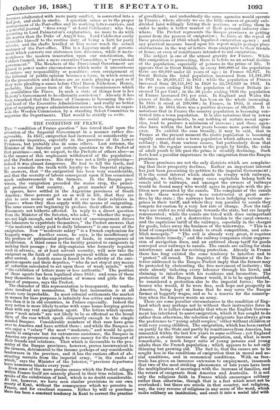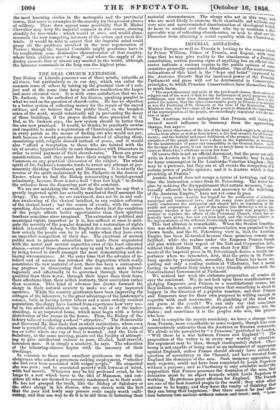THE CONDITION OF FRANCE.
DIE " condition of France question" has forced itself upon the attention of the Imperial Government in a manner rather dis- agreeable. In 1857, emigration had increased so considerably as to provoke inquiries, especially in the province of the Lower Pyrenees, but probably also in some others. Last autumn, the Minister of the Interior put certain questions to the Prefect of that province—and, we suspect, to the Prefects of others also—as to the causes of this unpleasant withdrawal of the population : and. the Prefect answers. His duty was not a little perplexing— indeed it was almost dangerous. tie had to tell the truth, and Tet to reconcile the truth with loyalty to the Imperial regime. lie answers, that " the emigration has been very considerable, and that the scarcity of labour consequent upon it has occasioned much embarrassment to the farmers. In the Basque pro- vinces, the emigration preceded the maize crop, the princi- pal produce of that country. A great number of Basques, it appears, have settled in the Argentine provinces of South America; these persons get on so well in life, that they are able to save money and to send it over to their relatives in France ; whom they thus supply with the means of emigrating. The same causes are beginning to produce their effects in arron- dissements not hitherto affected. In reply to a direct question from the Minister of the Interior, who asks, "whether the wages are not high enough, and whether want of encouragement drives the labourers to expatriate themselves," the Prefect answers that "the moderate salary paid to daily labourers" is one cause of the emigration. Now "moderate salary" is a French euphemism for beggarly wages. Another cause, he says, is the insufficiency of the produce of patrimonial portions of lands, in consequence of subdivision. A third cause is the facility granted to emigrants in making their passage ; for ship-captains who formerly required cash in advance, or at least solvent security, will now take the emigrant on the faith of subsequent payment within six months after arrival. A fourth cause is found in the activity of the emi- gration-agents and their deputies, "who do not stop at any means of seduction calculated to act upon those of weak minds, with "the exhibition of letters more or less authentic." The position of those agents has been legalized since 1855; and some of them busy themselves in the exportation of women and girls for the basest of purposes, says the Prefect. . The character of this representation is transparent, the confes- 510115 involved are momentous. The last insinuation is at all events very improbable. In most colonial settlements the market in women for base purposes is infinitely less active and remunera- tive than it is in old countries, in France especially. Indeed the very notion is more likely to arise with some home-keeping genius than with any real emigration agent. The letters which operate upon "weak minds" are not likely to be so effectual as the broad facts of the case which speak eloquently enough to the simple minded Basques. Considerable numbers of that race have gone over to America and have settled there ; and while the Basques in situ enjoy a " salary " the most " moderate " and would be quite unable to emigrate but for extraneous assistance, the Basques in America are prosperous enough to save money for the transport of their friends and relations. That which is favourable to the pea- santry of the Basque provinces, however, proves inconvenient to the farmers, detrimental to the income perhaps of any considerable landowners in the province, and it has the curious effect of ab- stracting recruits from the imperial army, "in the ranks of which, 'says the Minister of the Interior, "previous departures leave numerous blanks every year."
Even some of the more precise causes which the Prefect alleges Within France itself are scarcely placed in their true relation. He Speaks of the subdivision of land, which is no doubt considerable. At law, however, we have seen similar provisions in our own nay of Kent, without the consequence which we perceive in !ranee, and for excellent reasons. Either by will or purchase ;heft has been a constant tendency in Kent to correct the practice of gavelkind ; and undoubtedly the same agencies would operate in France ; where already we see the little owners of greatly sub- divided land willingly letting their portions, or selling them in order to make a better market of their personal industry else- where. Th'e Prefect represents the Basque provinces as getting poorer from the process of emigration ; he hints at the repeal of those provisions of 1855 which legalized emigration agency ; and any practical measure based upon his report might perhaps place obstructions in the way of letters from emigrants to their friends at home, or even of remittances intended to aid emigration.
The subject is one of the utmost gravity for France. While this emigration is proceeding, there is before us an actual decline of the population, especially of persons in the prime of life. It appears that in Great Britain, in every 100,000 of the population there are 69,919 under 35 years of age ; in France 62,827. In Great Britain the total population increased from 14,181,265 in 1821 to 20,959,477 in 1851 ; while the population of France increased from 30,451,187 in 1820 to 35,783,059 in 1851. In the 40 years ending 1851 the population of Great Britain in- creased 74 per Cent ; in the 36 years ending 1856 the population of France increased 181 per cent. In England and Wales the excess of births over deaths has been on the whole increasing. In 1855 it stood at 209,000; in France, in 1853, it stood at 141,000; in 1854 there was a positive decrease of 69,318. It is notorious that in France the country population is becoming con- verted into a town population. It is also notorious that in towns the social arrangements, to say nothing of certain moral agen- cies, tend to produce a minimum of increase ; and those agen- cies have within the last few years become more powerful than ever. To exhibit the case broadly, it may be said, that in. France at the present moment the rustic population is becoming rapidly converted into a town population which adheres much to celibacy ; that, from various causes, but particularly from that arrest in the regular accession to the people by births, the ratio of adult youth to life past the prime is steadily declining. Such facts lend a peculiar importance to the emigration from the Basque provinces.
Those provinces are not the only districts which are complain- ing that their prosperity declines. Rather an important interest has just been presenting its petition to the imperial Government ; it is the canal interest which stands in rivalry with railways, although, we believe, in many cases capitalists belong both to canals and to railways, and amongst the owners of railways would be found many who would agree in principle with the pe- tition now presented by the canals. The complaint of the canals is this : these water-ways were constructed at great sacri- fices by the state ; the railways have been indulging various ca- prices in their tariff, and where they run parallel to canals they compete for custom by a very low rate of charge. Now the rail- ways are under no real charges towards the state, but are largely remunerated; while the canals are taxed with dues unimportant for the treasury, yet a destructive burden to the canal owners ; and the capricious tariff of the railways, especially in the charges for goods, takes away the business of the waterways. "This is a kind of competition which tends to crush competition, and esta- blish monopoly." " The evil is already very great, it requires an immediate remedy," and the railway companies claim suppres- sion of navigation dues, and an enforced cheap tariff for goods conveyed over railways to canals. The canals are calling for state interference and are for reviving protection. Already in France there has long existed the same tendency to interfere and to "protect" all round. The inquiries of the Minister of the In- terior addressed to the Basque Prefectimply that the farmer may be protected by obstructing the free movement of industry ; the state already ticketing every labourer through his livret, and claiming to interfere with his residence and locomotion. The protection of the Basque farmer would, it is to be apprehended, be considered a protection also to the imperial forces ; the la- bourer who would, if he were free, seek hope, and prosperity in. America, being kept at home that he may serve the Basque farmer at beggarly wages, and so be a reserve for the conscrip- tion when the Emperor .wants an army.
There are some peculiar circumstances in the condition of Eng- land which may perhaps not be without their instructive force in France. It is rather remarkable that where the English Govern- ment has interfered to assist emigration, which it has sought to do rather than otherwise, the selection of emigrants has always given the preference to "young adult couples," either without children or with very young children. The emigration, which has been carried on partly by the State and partly by remittances from America, has amounted within the last few years to some millions ; yet England presents a steady increase of the population, and, what is more remarkable, a much larger ratio of young persons and young adults than the French population ; which appears to be not only thinning but growing old. The fact is, that the causes are to be sought less in the conditions of emigration than in moral and so- cial conditions, and in economical conditions. With us free- trade has given an immense extension to employment, insomuch that two of the most striking phenomena of late years have been the multiplication of marriages with the increase of families, and the return of emigrants from America and Australia. It is not only the religious faith in France which encourages celibacy rather than otherwise, though that is a fact which must .nct be overlooked; but there are creeds in that country, not religions, nay, the very reverse of religious in any sense of the word, which make celibacy an institution, and erect it into a social lad with the most knowing circles in the metropolis and the provincial towns, that serve as examples to the country for the grossest abuses of celibacy. There does appear some possibility that M. Michel Chevalier may keep the imperial counsels in due course, steering steadily for free-trade ; which would at once, and would alone, reconcile the now oompeting interests of the urban and rural dis- tricts. It would be wild to expect that the imperial mind could grasp all the problems involved in the true regeneration of France ; though the Special Constable might perchance have in his recollection some distinctive characteristics of that country, where little children are "a drug," and where the supply, of in- dustry exceeds that of almost any market in the world, although the labourer commands in the long run the highest price.



























 Previous page
Previous page